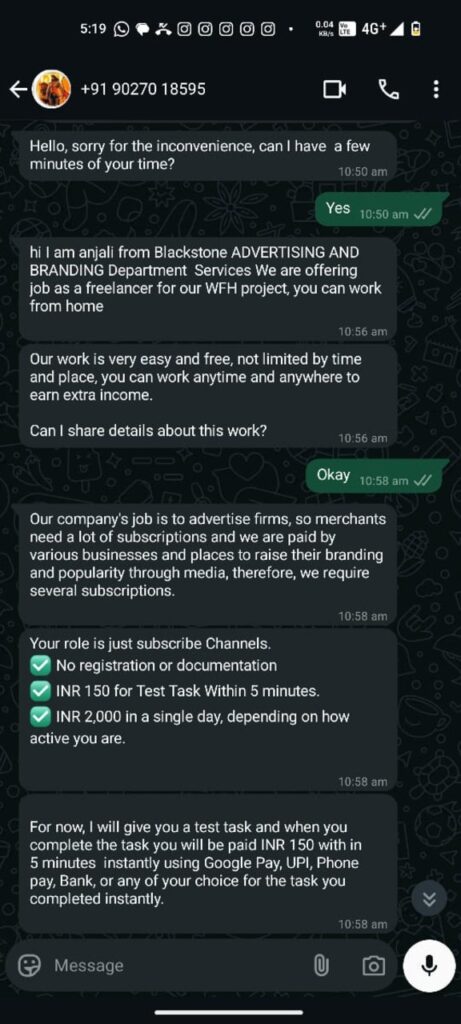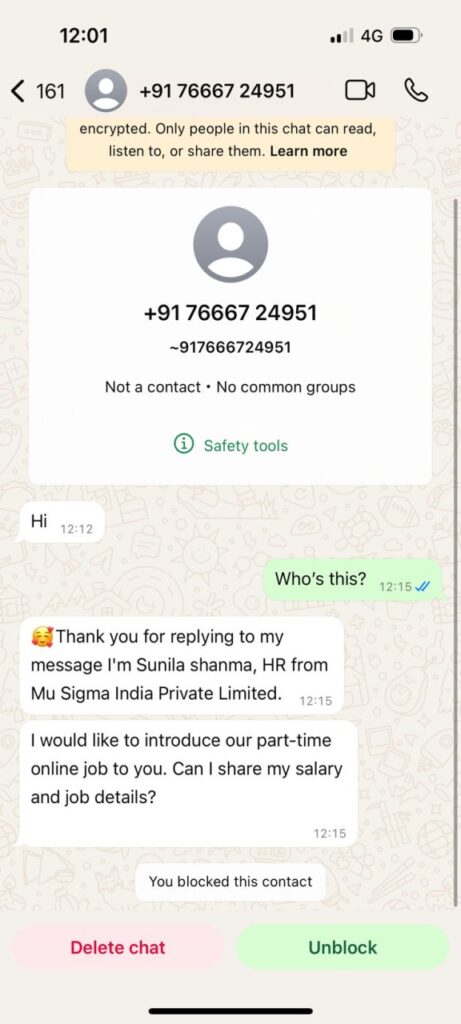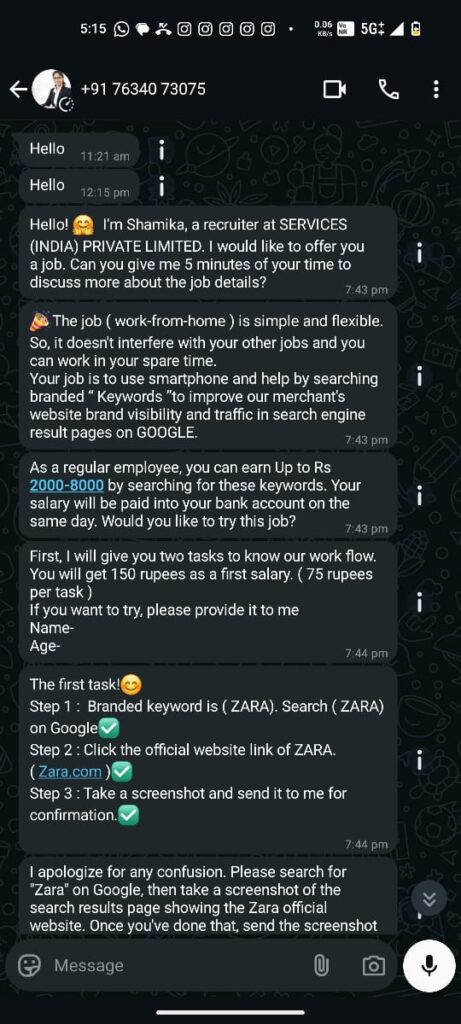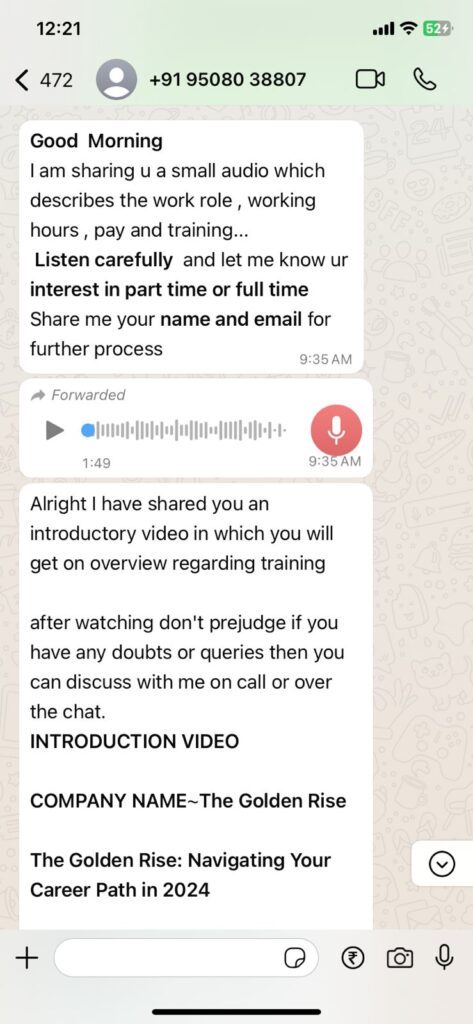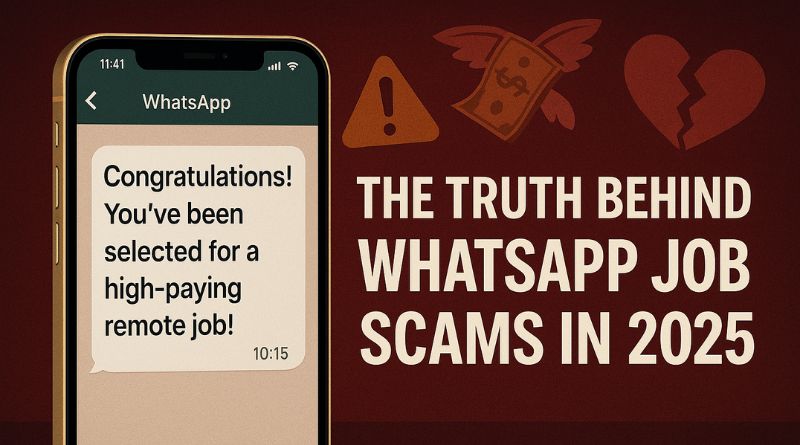
WhatsApp Job Scams in 2025 | How These Scammers Operate? | Real Stories | Red Flags | How to Stay Safe? | How to Find Real Jobs? | What to Do If You’ve Been Scammed? | Final Thoughts
So there I was last Tuesday, scrolling through WhatsApp while having my morning coffee, when ping – a message from an unknown number. “Congratulations! You’ve been selected for a high-paying remote job opportunity!” (WhatsApp job scam Alert!!!)
My first thought? Yeah, right. But then I remembered my friend telling me about how she actually found a decent freelance gig through a WhatsApp group. So for a hot second, I almost clicked that link.
Thank goodness I didn’t, because what I discovered next made my blood run cold.
The Ugly Truth About WhatsApp Job Scams in 2025
Here’s what’s really happening: scammers have basically turned WhatsApp into their personal hunting ground. And they’re not just targeting a few people here and there – we’re talking massive operations that are fooling thousands of job seekers every single day.
Get this – a recent survey found that 42% of WhatsApp users in India have received fake job offers asking for money upfront. That’s almost half of all users! When I first read that statistic, I had to read it twice because it seemed so crazy.
But then I started asking around. My neighbor’s cousin lost ₹30,000 to a fake data entry job. My college friend’s sister got scammed out of ₹15,000 for what she thought was training for a customer service role. It’s happening to real people, people just like you and me who are trying to make an honest living.
How These Scammers Actually Operate (It’s Scarier Than You Think)

Let me paint you a picture of how smooth these criminals are. They don’t just send random messages and hope for the best. Oh no, they’re way more sophisticated than that.
Here’s their playbook:
- The Hook: You get a message that feels almost legitimate. Maybe they mention your city, or they reference a job portal where you actually have a profile. “Hi! I saw your resume on Naukri and think you’d be perfect for this role!”
- The Bait: They dangle exactly what you want to hear. Work from home? Check. Flexible hours? Check. Good pay for minimal experience? Double check. They know what desperate job seekers want, and they use it against us.
- The Switch: Once they have your attention, the requests start small. “Just send us a copy of your ID for verification.” Then it escalates. “We need a small registration fee to activate your account.” Before you know it, you’re in deep.
I’ve seen these scams take so many forms:
- Those “easy” product review jobs where you supposedly get paid to rate restaurants online
- Social media influencer tasks that require you to invest your own money first
- Data entry positions that require expensive software licenses
- Customer service roles with hefty training fees
Real People, Real Losses (These Stories Will Break Your Heart)
Let me tell you about some real cases that happened just in the past few months. These aren’t made-up stories – these are real people who trusted the wrong message.
- There’s this heartbreaking case from Mangaluru where four people lost over ₹50 lakh combined. Fifty lakhs! That’s life-changing money for most families. They got invited to WhatsApp groups that looked legitimate, with other “employees” sharing their success stories. Turns out, all those success stories were fake accounts run by the same scammer network.
- Then there’s Ravikant Yadav’s case that really got to me. This guy was a former Army sepoy – someone who served our country – and he ended up scamming over 20 young people out of ₹1 crore by pretending to be an Army colonel. He was issuing fake appointment letters that looked so real, people quit their existing jobs to join his fake organization.
- But the one that really hit me was this woman from Bengaluru. She was just trying to make some extra money from home, you know? She found what seemed like a legitimate job rating restaurant websites. Started small, made a little money, gained trust. Then they convinced her to invest larger amounts for “premium tasks.” She ended up losing ₹7.5 lakh – money she probably needed for her family, her kids’ education, who knows what important expenses.
The Red Flags I Wish I’d Known Earlier

After talking to victims and doing some digging, I’ve put together a list of warning signs that could save you from becoming the next target:
- The Contact Method: Real recruiters don’t slide into your WhatsApp DMs from random numbers. They use official email addresses, LinkedIn, or proper job portals. If someone’s recruiting through WhatsApp, that’s your first red flag right there.
- The Money Talk: This is the big one – if anyone asks you for money before giving you a job, run. I don’t care if they call it registration fees, training costs, equipment deposits, or unicorn food. Legitimate employers pay you, not the other way around.
- The Pressure Cooker: “This offer expires in 24 hours!” “Only 5 spots left!” “Apply now or lose this opportunity forever!” Real job opportunities don’t work like flash sales. If someone’s pressuring you to decide immediately, they’re probably trying to stop you from thinking clearly.
- The Grammar Police: I hate to be that person, but professional recruiters usually know how to spell. If the message is full of typos, weird grammar, or sounds like it was translated through Google Translate three times, be suspicious.
- The Verification Vacuum: Try finding the company online. Real companies have websites, social media presence, employee reviews on Glassdoor. If you can’t find any trace of them existing outside of that WhatsApp chat, that’s a massive red flag.
How to Stay Safe from Online Job Scams?
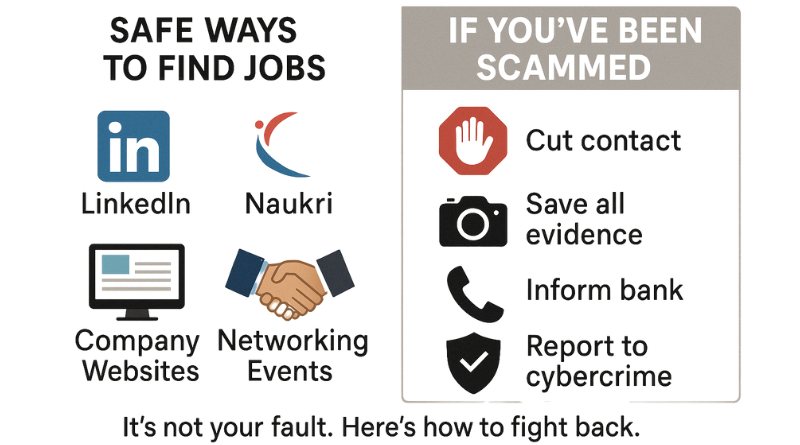
After all this research, I’ve developed my own little system for dealing with job opportunities that come through WhatsApp or any unexpected channel:
- The 24-Hour Rule: Never make any decision immediately. Sleep on it. Talk to friends or family. If it’s legitimate, they’ll wait.
- The Verification Process: Before I engage with any potential employer, I do my homework. I look them up on LinkedIn, check their website, and see if they have real employees posting about working there.
- The Money Test: If they ask for any payment whatsoever, I’m out. No exceptions, no “but they seem legitimate,” no “it’s just a small amount.” Zero tolerance policy.
- The Documentation Dance: I never share sensitive documents like Aadhaar cards, PAN cards, or bank details unless I’m 100% certain about the legitimacy of the employer.
- The Network Check: I ask around in my professional network. Someone usually knows someone who works at a legitimate company, and they can verify if the opportunity is real.
Finding Real Jobs in This Crazy Market
Just because scammers are everywhere doesn’t mean all online job opportunities are fake. I’ve actually found some great gigs through legitimate channels. Here’s what’s worked for me and my friends:
- Stick to the Classics: LinkedIn is still king for professional opportunities. Naukri.com has been around forever and vets their listings. Indeed, Monster – these platforms have reputations to protect, so they’re generally safer.
- Company Direct: If you see a job posting that interests you, go directly to the company’s website and apply there. It takes an extra step, but it cuts out the middleman who might be a scammer.
- Network Like Your Job Depends on It: Some of the best opportunities I’ve gotten came through people I know. Join professional groups on LinkedIn, attend virtual networking events, and stay in touch with former colleagues.
- The Slow and Steady Approach: Building a legitimate online career takes time. Be wary of anything promising instant success or easy money. Real work requires real effort.
What to Do If You’ve Been Scammed?
If you’re reading this and thinking, “Oh no, I think I fell for one of these,” first of all, don’t panic. You’re not alone, and you’re not stupid. These scammers are professionals, and they’re good at what they do.
Here’s what you should do immediately:
- Stop all communication with the scammer
- Don’t send any more money
- Report the number to WhatsApp
- File a complaint with your local cybercrime cell
- If you’ve shared banking information, contact your bank immediately
- Document everything – screenshots, transaction details, all of it
My Final Thoughts (From One Job Seeker to Another)
Look, I get it. The job market is tough right now. When you’re looking for work, especially when you really need it, it’s easy to want to believe in opportunities that seem too good to be true. The desperation is real, and these scammers know exactly how to exploit that.
But here’s what I’ve learned: desperation makes us vulnerable, but knowledge makes us strong. The more we know about these scams, the better we can protect ourselves and our families.
I’ve started having conversations about this with everyone I know. My parents, my siblings, my friends – because these scammers don’t discriminate. They’ll target college graduates looking for their first job, experienced professionals seeking career changes, and everyone in between.
The internet has made it easier to find work, but it’s also made it easier for criminals to find victims. We need to be smarter, more cautious, and more connected to our communities so we can look out for each other.
Have you encountered any suspicious job offers lately? Or maybe you have tips that have helped you avoid scams? I’d love to hear your stories and strategies. Let’s build a community where we protect each other from these predators.
Ping us with your thoughts or comments on our Instagram @theinfosiast
Stay safe out there, and remember – if something feels off, trust your gut. Your instincts are usually right.

